BY PATRICE INGRASSIA | Barbara Joan Love, a seminal figure of the women’s, lesbian and gay rights movements, died after complications from long-term leukemia and Parkinson’s at Calvary Hospital, in the Bronx, on Nov. 13.
Fearless, daring and a prominent lesbian activist in the 1960s and ’70s, author Barbara J. Love risked losing jobs and family relationships as she refused to keep her sexual identity hidden. After much repression and guilt, she recognized who she was and that there were others like her. A lifelong lesbian activist was born.
In addition to co-founding groups such as PFLAG (Parents and Friends of Lesbians and Gays) and Identity House, she was proud of her work as a leader of the board of the National Gay Task Force for about 10 years. She received commendation for “working tirelessly to educate the public about lesbian and gay concerns.” And she testified three times before the New York City Council in the 1970s, through which she contributed to changes in discriminatory practices against gays.
The author of four books, Love co-authored “Sappho Was a Right-on Woman: A Liberated View of Lesbianism” (Stein and Day, 1972), with her then-partner, Sidney Abbott, considered to be the earliest nonfiction book that explores the transition from guilt to pride in being a lesbian. The New York Times review called the book, “A resounding lesbian and feminist document of vital interest to all females, in and out of the feminist movement.”
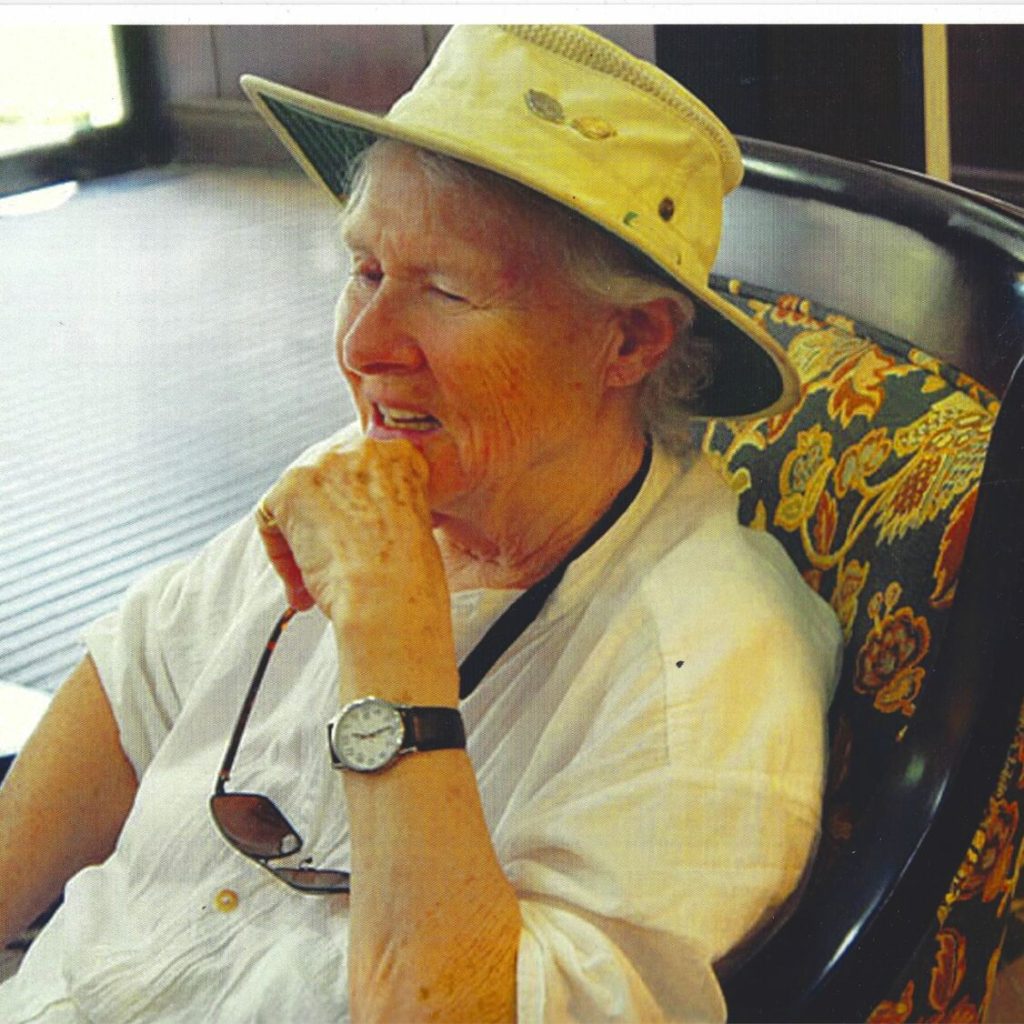
She was the organizing force and editor for “Feminists Who Changed America, 1963-1975” (University of Illinois Press), a monumental compilation of 2,300 autobiographies focusing on frontline men and women, including both well-known and grassroots organizers, who took dramatic actions to change society. Prior to this, in 1970 she published “Foremost Women in Communications” to highlight women in a profession dominated at the highest ranks by men.
In 2021, she published her memoir, “There at The Dawning: Memories of a Lesbian Feminist,” sharing her firsthand experiences of being present at the birth of the modern women’s movement known as second wave feminism.
She fought vigorously, in what was a struggle in 1971, to force the National Organization for Women (NOW), the leading feminist organization of the time, to recognize lesbianism as a feminist issue. She co-founded Identity House, a peer counseling group for lesbians and gays, as well as the predecessor group to PFLAG.
In words and action, she saw the shared paths of feminism and gay and lesbian rights, saying, “We have to achieve Gay Liberation before women’s liberation can be successful.”
Gloria Steinem reflected upon Love’s life by saying, “From the earliest days of this wave of feminism, Barbara Love brought women together across the many adjectives meant to divide us.”
Barbara Love joined NOW in 1967. Her invitation to the local chapter meeting included a request to bring a chicken dish. With characteristic humor, she remarked years later, “I couldn’t believe I’d joined the women’s movement to cook!”
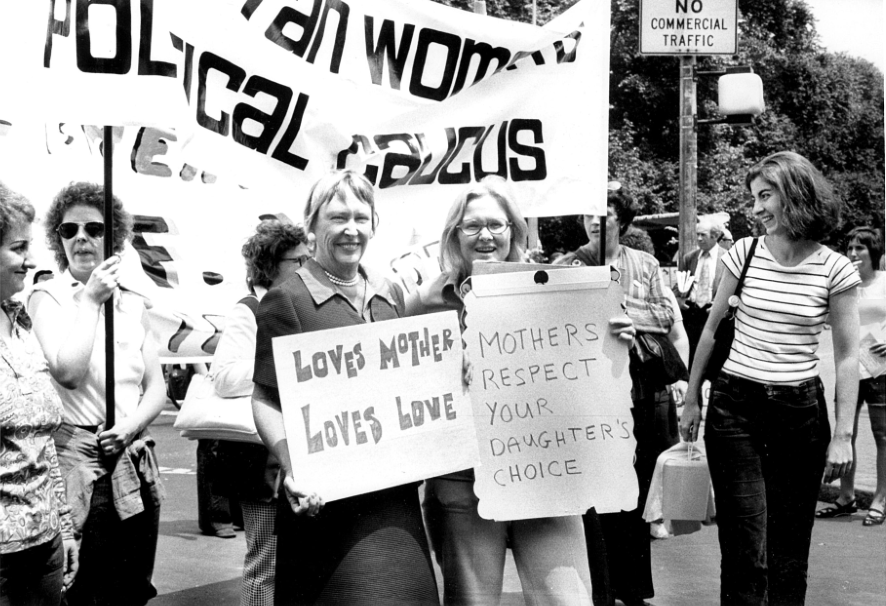
She became a vocal and active member of NOW. She led a group that exposed discrimination and harassment of women on the assembly line at Colgate-Palmolive, using street theater at its corporate headquarters.
Barbara was an “out” writer/editor at a publishing company and became a changemaker within her industry. With NOW she organized and participated in demonstrations with Kate Millett and others, such as one at The New York Times, which eventually changed the discriminatory practice of gender-segregated “want ads” that blocked opportunity and equitable pay for equal work.
She and other feminists saw the need to build on the accomplishments of first wave feminists of the 1920s to win voting and property rights for women. In this “second wave” of feminism, they fought for sexual and reproductive rights, as well as equal opportunity in education and the workplace. Barbara’s sharp intellect, persistence and humility won respect, while her powerful communication skills helped the movement succeed.
She proudly called herself a “feminist troublemaker.” Wanting to establish a forum where women felt self-esteem and pride, Love helped start the country’s earliest lesbian feminist consciousness-raising groups. She became a member of a group called Radicalesbians and co-founded with Elizabeth Shanklin the Matriarchists, a non-mainstream feminist group.
Love was part of the group that tried at the 1972 Democratic National Convention to get gay rights on the party’s plank — unsuccessfully. Undeterred, in 1973 she joined the board of directors of the National Gay Task Force to secure gay rights nationally, going on to serve on the board for nine years.
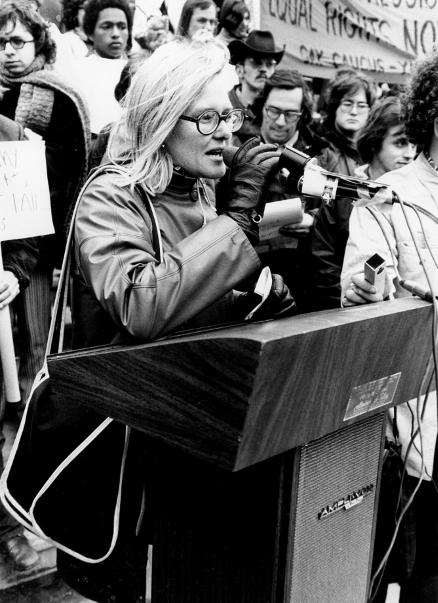
In 1977 she was appointed by the Carter administration as a New York delegate to the National Women’s Conference in Houston, a contentious forum that eventually passed a lesbian rights plank calling for the end of discrimination on the basis of sexual and affectional preference.
She was a Connecticut resident when AIDS began its death toll among the gay community. In 1982 she co-founded The AIDS Project of Greater Danbury with Dr. Donald T. Evans and others to advocate for and provide services to people living with H.I.V./AIDS.
“I was very loud in all the right places,” she noted.
From 1998 through 2006 Barbara Love worked with activists, scholars and authors to capture the lives of the pioneers of second wave feminism as the editor of “Feminists Who Changed America, 1963-1975.”
This work featured 2,200 biographies, many of them of less-well-known frontline changemakers, to show why the second wave women’s movement succeeded so quickly and persuasively.
“More than any other social revolution in history, ours grew from the struggles of thousands of individuals to erase thousands of separate forms of discrimination in every sector of society,” she wrote.
Of the women in the book, she wrote, “These women suffered. They were brave. They were brilliant.”
Gloria Steinem wrote, “No home, library or school is complete without this guide to the women who looked at the world as if everybody mattered, and so began a revolution.”
Barbara was a co-founder of Veteran Feminists of America (VFA) when the group was founded three decades ago. She was a longtime board member of the group, promoting its mission to document, preserve and share the achievements of those who pioneered the modern women’s movement.
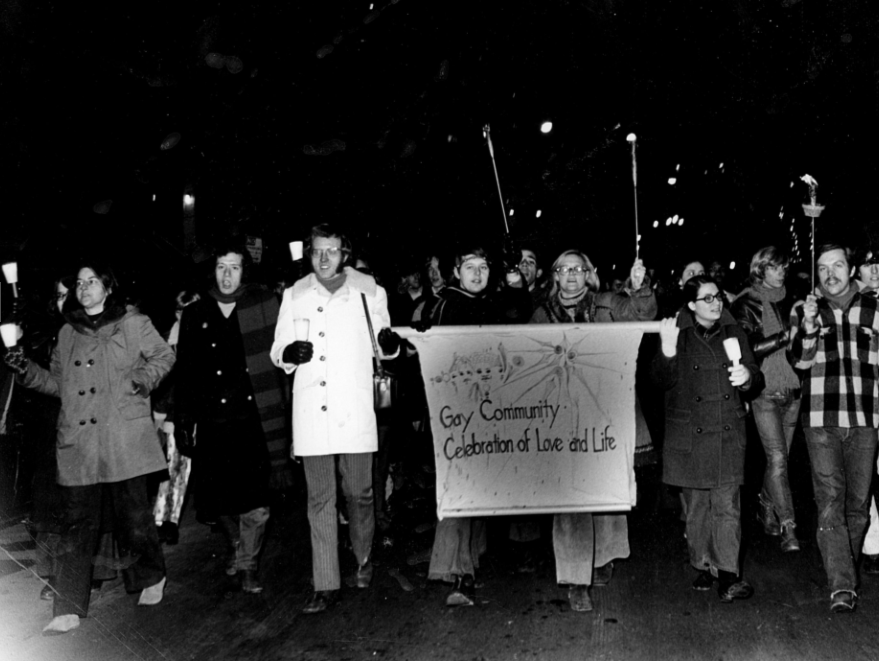
Dr. Eleanor Pam, president of VFA said, “Barbara’s impact and influence on behalf of gender justice will continue to influence and inspire future generations.”
Love’s “There at The Dawning: Memories of a Lesbian Feminist” shares her personal experience of progressive activism, alongside cohorts of the second wave, such as Kate Millett, Gloria Steinem, Florynce “Flo” Kennedy and others.
Born into an affluent and conservative Ridgewood, New Jersey, family in 1937, Barbara proved to be a talented swimmer at an early age. She competed locally at the age of 3 and was featured in a New York Times article for her determined approach at the age of 13. She was part of a girls’ relay team that won a 1956 AAU (Amateur Athletic Union) championship that held the world record for decades. Her determination, as well as her focus on teams and winning, were foundational to her approach to social change.
She studied journalism and graduated from Syracuse University with a B.A. in 1959. She received her M.A. in psychology from The New School for Social Research in 1975.
At 31, she told her mother, Lois, that she was gay, recalling later that Lois responded, “First to thine own self be true.”
Her mother joined Barbara two years later at the Gay Pride March in New York in 1970 as one of the four parents present. Along with Morty Manford of the Gay Activists’ Alliance, and their mothers, including Jean Manford, Love helped start Parents of Gays, today known as PFLAG (Parents and Friends of Lesbians and Gays).
She also was one of the founders of Identity House, a free, walk-in peer-counseling center in New York City for gays and their families, which in 2022 is celebrating its 50th year of operation.
She was exuberant about the U.S. Supreme Court ruling in 2015 recognizing same-sex marriage as a legal right. Three years later, she married her longtime partner of 26 years, Donna Smith, an award-winning psychotherapist, recognized for her work with gay youth. Officiating at the wedding was her friend David Dinkins, New York City’s former mayor.
Barbara Love is survived by her wife, Donna Smith, as well as her sister, Ellamae Cobb, of Allendale, New Jersey, and her brother, Anthony Love, and his wife, Roberta Love, of Melbourne, Florida. She was predeceased by her parents, Egon and Lois Love, and her brother, Douglas Love.
A memorial service will be planned for the future. Donations in honor of Barbara Love may be made to Identity House, at IdentityHouse.org, and Parents and Friends of Lesbians and Gays, at PFLAGnyc.org.

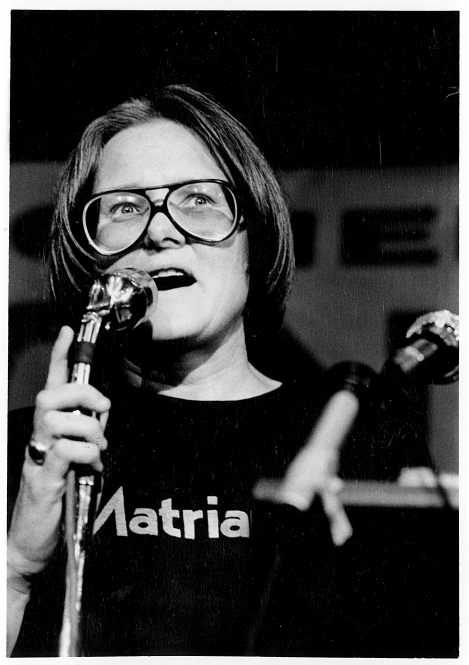
Thank you for this tribute.